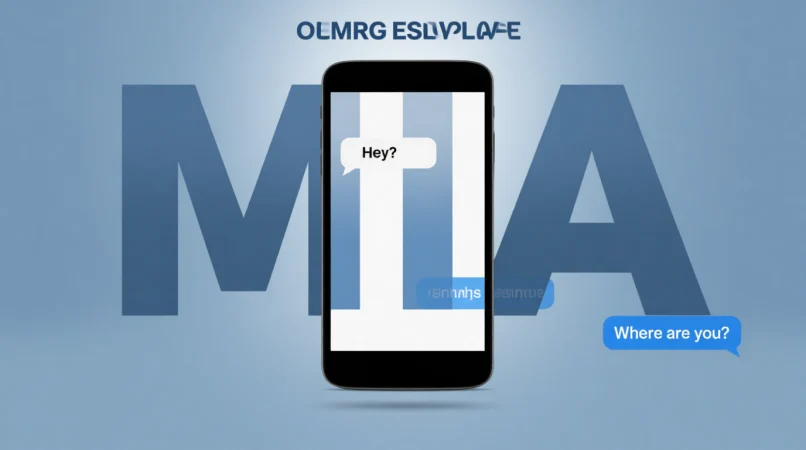Ever texted someone and got no reply for days — only to hear later, “Sorry, I was MIA”? 😅
“MIA” is one of those phrases that pops up everywhere — from casual chats to military reports to social media captions. But what does it actually mean, and why do people use it so often?
In this article, we’ll explore the full meaning of “MIA,” its origin, different contexts (from texting to professional life), and how to use or respond to it naturally.
If you’re decoding a friend’s cryptic message or just expanding your slang IQ, this quick guide will help you understand what being “MIA” really means.
💬 Definition & Meaning
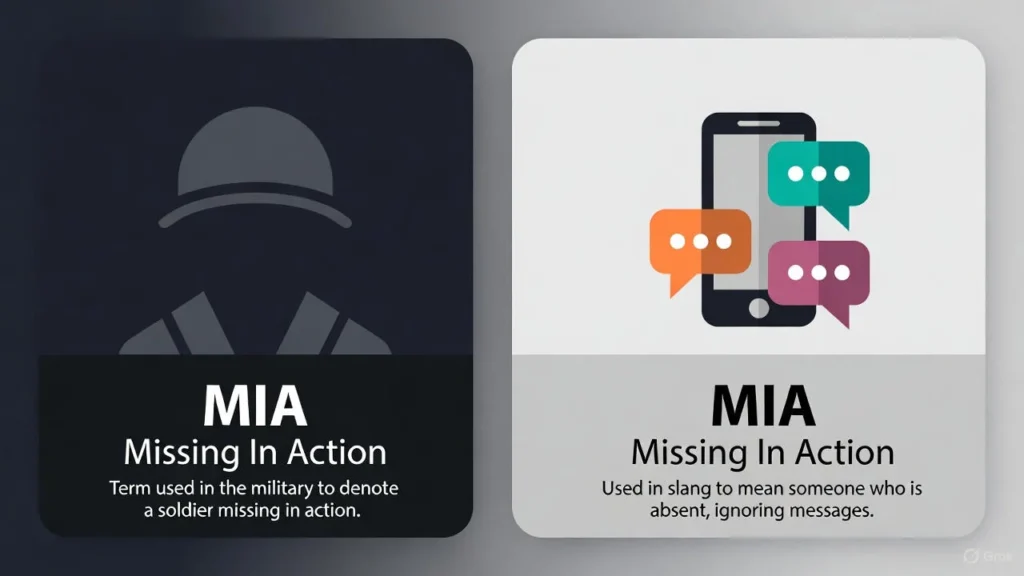
MIA stands for “Missing in Action.”
Originally a military term, it described soldiers who were unaccounted for during combat. Over time, it evolved into modern slang to describe anyone who disappears, goes silent, or becomes unresponsive — especially online.
Examples:
- “Where have you been? You’ve been MIA all week!”
- “Sorry, I went MIA from Insta for a bit.”
- “Our teammate’s been MIA since the project started.”
In short, being MIA means you vanished without notice — intentionally or not.
| Context | Meaning | Example |
|---|---|---|
| Texting | Ignoring or not replying | “You’ve been MIA all day 😒” |
| Social Media | Taking a break or not posting | “Been MIA from TikTok for a while 👋” |
| Work/School | Absent without update | “John’s been MIA during the meeting.” |
| Military | Missing in combat | “Soldier reported MIA after mission.” |
🕰️ Background & Origin
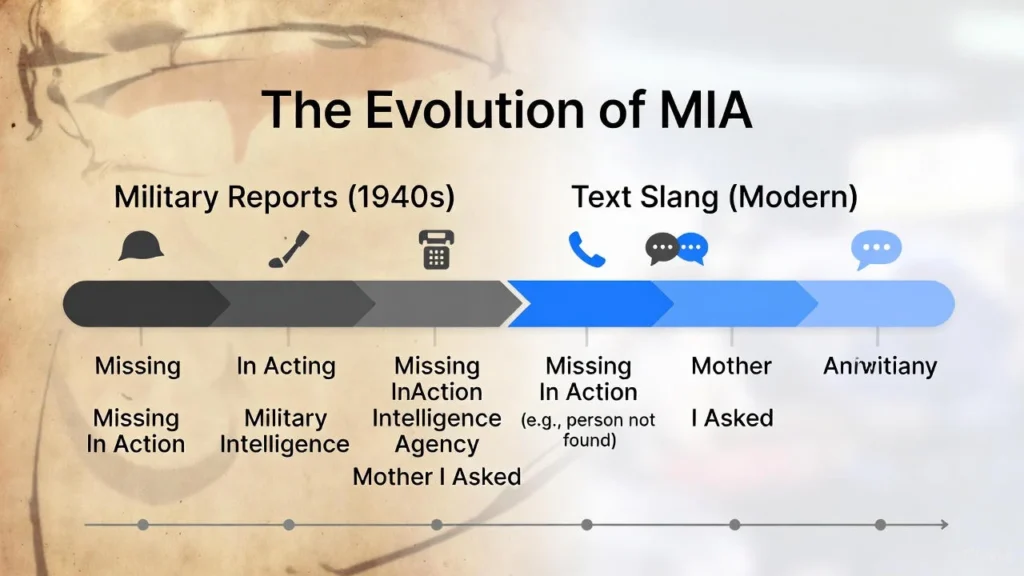
The term “MIA” dates back to World War II, used in official military reports to describe soldiers who were missing and whose status was uncertain.
By the late 20th century, the abbreviation entered pop culture and digital slang — appearing in movies, hip-hop lyrics, and eventually text messages.
Today, it’s a universal phrase used across languages and regions to describe emotional or digital disappearance — from ignoring texts to vanishing from social life for “mental health breaks.”
📱 Usage in Various Contexts
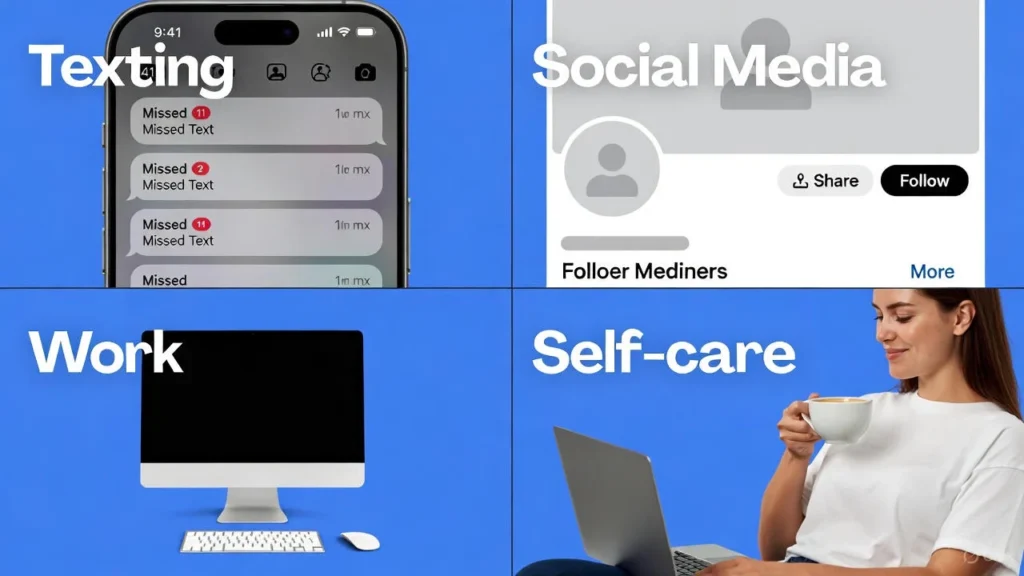
In Texting:
A: “Hey, haven’t heard from you in forever!”
B: “Yeah, sorry, I went MIA for a bit 😅.”
On Social Media:
“Been MIA but I’m back! Needed a reset. 🌿”
At Work or School:
“Let’s check on Kevin — he’s been MIA from meetings lately.”
In Pop Culture:
- Celebrities say they’ve been MIA after going off-grid.
- Musicians and influencers use it to explain breaks from fame.
Basically, MIA = gone quiet, offline, or unavailable — intentionally or unintentionally.
🤔 Common Misconceptions
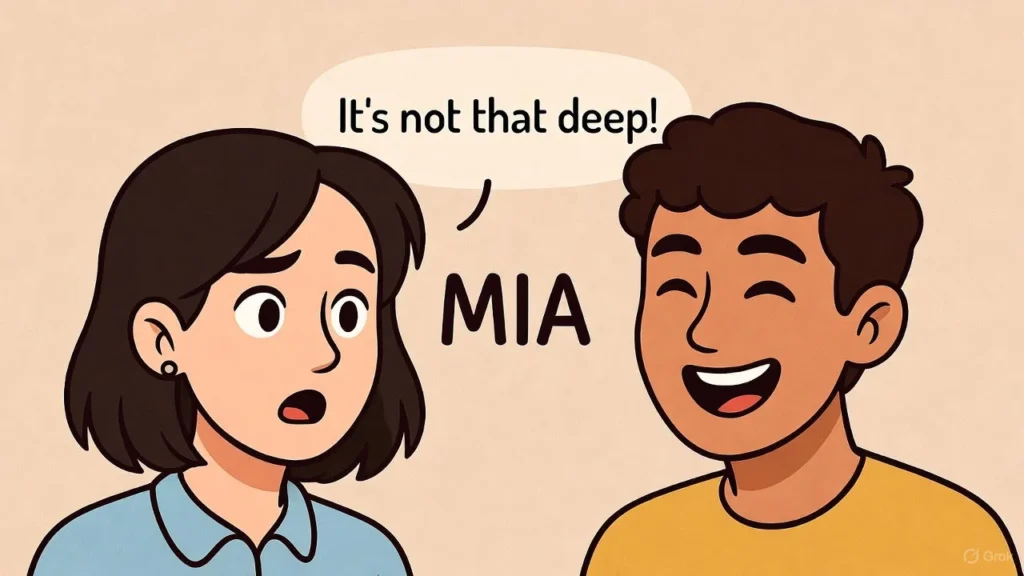
- ❌ “MIA” doesn’t always mean ignoring someone.
Sometimes people go MIA for rest, focus, or privacy. - ❌ Not a negative term by default.
In casual contexts, it’s often playful: “Girl, you’ve been MIA!” - ⚠️ Be careful in professional settings.
In work emails, “MIA” can sound unprofessional unless used lightly.
🔁 Similar Terms & Alternatives
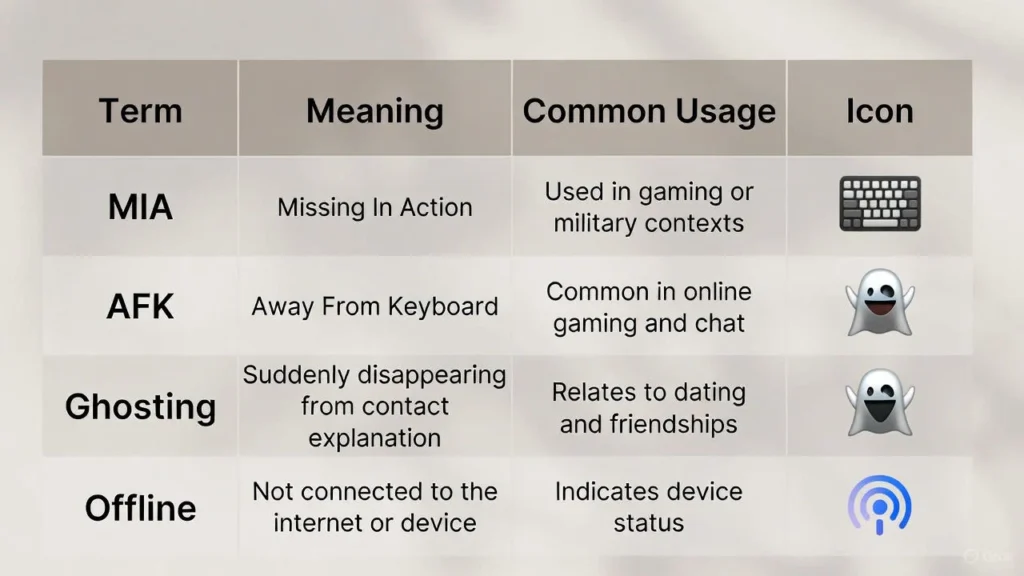
| Term | Meaning | Context |
|---|---|---|
| AFK | Away From Keyboard | Gaming, texting |
| Ghosting | Ignoring someone completely | Dating, friendships |
| Off the grid | Disconnecting from tech | Social media detox |
| Out of pocket | Unavailable | Work or slang |
| Vanished | Disappeared | General slang |
💬 How to Respond to “MIA”

If someone calls you MIA:
- Casual: “Haha, yeah! Needed a social nap 😂.”
- Apologetic: “Sorry, I’ve been MIA — busy with work.”
- Funny: “Me? MIA? More like undercover mode 🕵️.”
- Professional: “Apologies for being unavailable earlier; I was handling a priority task.”
🌎 Regional or Cultural Use
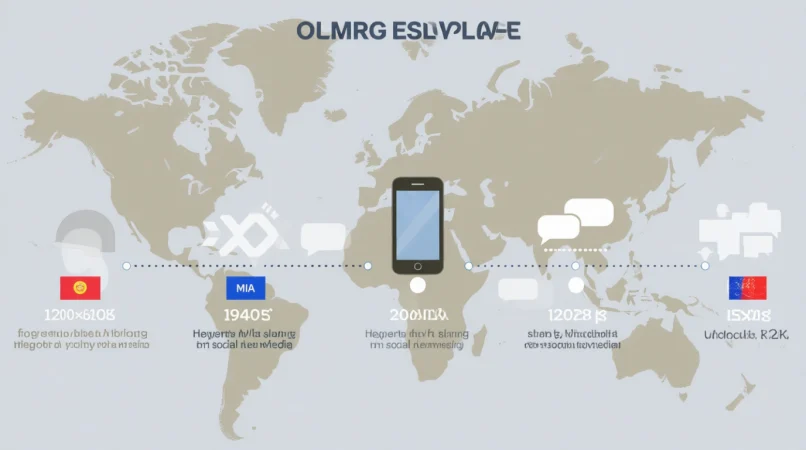
- In North America, “MIA” is everyday slang.
- In Europe, it’s known but used less casually.
- In Asia, it’s gaining popularity via TikTok and Gen Z internet slang.
- The military meaning still holds formal importance globally.
⚖️ Comparison with Similar Terms
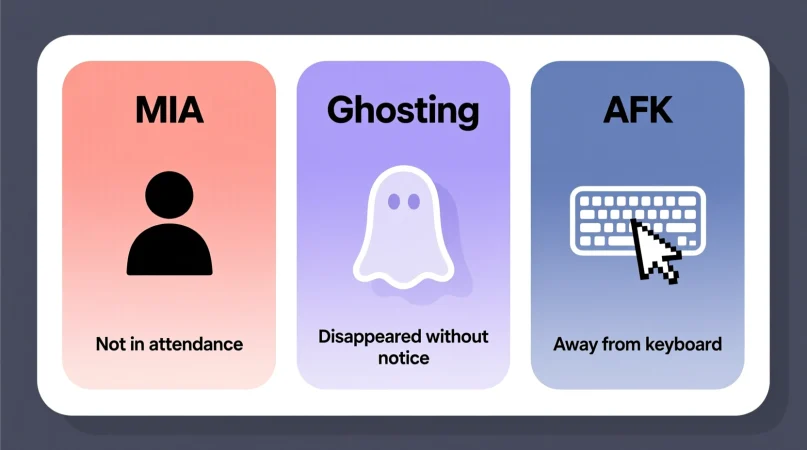
| Phrase | Tone | Context |
|---|---|---|
| MIA | Neutral / Casual | Everyday conversations |
| Ghosting | Negative | Dating/friendship |
| AFK | Neutral | Gaming or work |
| Offline | Neutral | Social media or tech |
💻 Usage in Online Communities & Dating Apps
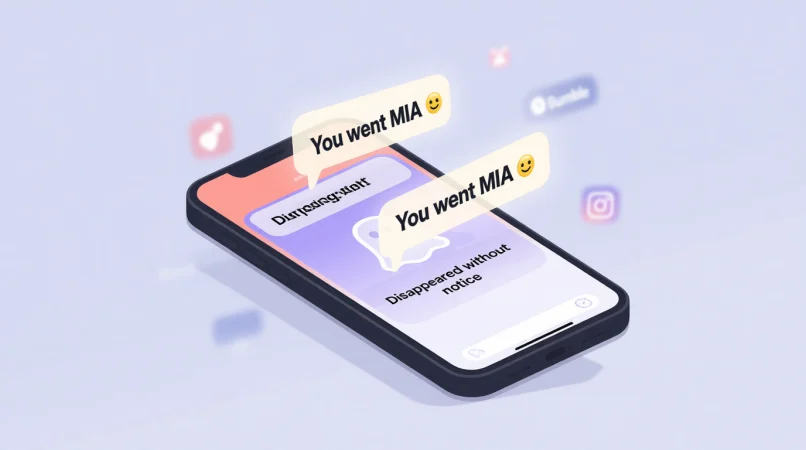
“MIA” is trending across platforms like TikTok, Instagram, and Snapchat, often in captions like:
“Sorry I’ve been MIA 😴 just needed to recharge.”
On dating apps, it can describe someone who stops replying:
“He went MIA after our first date.”
It’s also common in mental health posts where users share they’ve been “MIA” for self-care reasons.
🚫 Hidden or Offensive Meanings
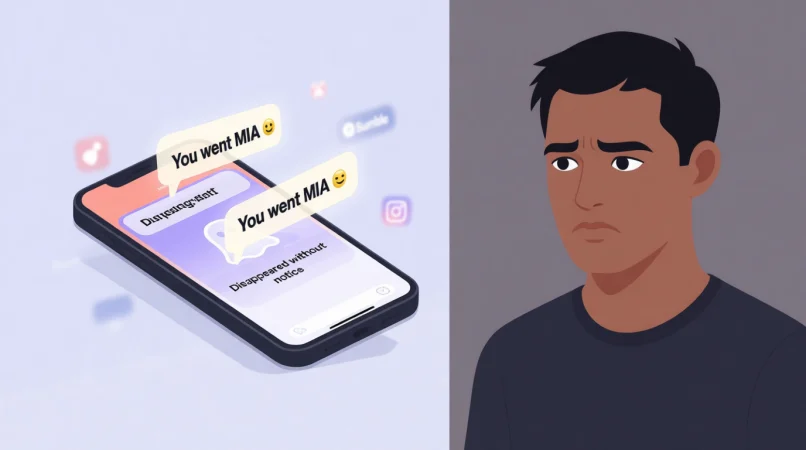
“MIA” itself isn’t offensive — but can sound cold or dismissive in serious relationships if used to downplay ignoring someone.
Context and tone decide how it’s received.
🏢 Suitability for Professional Communication

In professional writing, avoid slang abbreviations like “MIA.”
Instead, say:
- “I was unavailable earlier.”
- “I took some time off.”
- “I’ve been handling other priorities.”
Use “MIA” only in informal team chats or lighthearted messages.
❓ FAQs
- What does MIA stand for?
→ “Missing in Action.” - Is MIA bad to say?
→ Not necessarily — depends on tone and situation. - What does MIA mean in texting?
→ Someone’s been quiet, offline, or not replying. - Is MIA used professionally?
→ Rarely. It’s considered informal slang. - What’s the difference between MIA and ghosting?
→ Ghosting is intentional ignoring; MIA can be unintentional absence.
🌺 Conclusion
“MIA” started as a serious military term but evolved into a lighthearted slang for going quiet or disappearing temporarily.
If you’re taking a social break or just forgot to reply, it’s a phrase that perfectly captures modern digital silence.
So next time you say someone’s been “MIA,” remember — they might just be taking a well-deserved breather. 🌿

